| Srl | Item |
| 1 |
ID:
144919
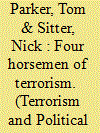

|
|
|
|
|
| Summary/Abstract |
David Rapoport's concept of Four Waves of terrorism, from Anarchist terrorism in the 1880s, through Nationalist and Marxist waves in the early and mid-twentieth century, to the present Religious Wave, is one of the most influential concepts in terrorism studies. However, this article argues that thinking about different types of terrorism as strains rather than waves better reflects both the empirical reality and the idea that terrorists learn from and emulate each other. Whereas the notion of waves suggests distinct iterations of terrorist violence driven by successive broad historical trends, the concept of strains and contagion emphasizes how terrorist groups draw on both contemporary and historical lessons in the development of their tactics, strategies, and goals. The authors identify four distinct strains in total—Socialist, Nationalist, Religious, and Exclusionist—and contend that it is possible to trace each strain back to a “patient zero” active in the 1850s.
|
|
|
|
|
|
|
|
|
|
|
|
|
|
|
|
| 2 |
ID:
102700
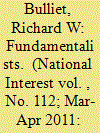

|
|
|
|
|
| Publication |
2011.
|
| Summary/Abstract |
MANY PEOPLE believe the world is-or should be-reaching a consensus on the universal and inevitable superiority of the rationalistic, humane and rights-based values of Western civilization.
|
|
|
|
|
|
|
|
|
|
|
|
|
|
|
|
| 3 |
ID:
105256


|
|
|
| 4 |
ID:
101338
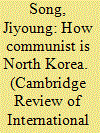

|
|
|
|
|
| Publication |
2010.
|
| Summary/Abstract |
This article focuses on the Marxist characteristics of North Korea in its interpretation of human rights. The author's main argument is that many Marxist features pre-existed in Korea. Complying with Marxist orthodoxy, North Korea is fundamentally hostile to the notion of human rights in capitalist society, which existed in the pre-modern Donghak (Eastern Learning) ideology. Rights are strictly contingent upon one's class status in North Korea. However, the peasants' rebellion in pre-modern Korea was based on class consciousness against the ruling class. The supremacy of collective interests sees individual claims for human rights as selfish egoism, which was prevalent in Confucian ethics. The prioritization of subsistence rights and material welfare over civil and political rights was also the foremost important duty of the benevolent Confucian king. Finally, unlike Marx's reluctant use of the language of 'duties', rights are the offspring of citizens' duties in North Korean human rights discourse.
|
|
|
|
|
|
|
|
|
|
|
|
|
|
|
|
| 5 |
ID:
132216
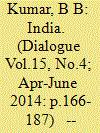

|
|
|
|
|
| Publication |
2014.
|
| Summary/Abstract |
Our discourse on 'National Integration' in post-independence India, and the related issues and challenges, is often shrouded in confusion and haziness. Myths and misinterpretation of our history, culture and religion abound even after independence. This is precisely because of the multiple lack syndromes of our scholarship, which continues to be basically colonial and Marxist; it dogmatically resists change in old perceptions. This is because the British believed, as Churchil once said that 'the empires of the future are the empires of the mind'. Macaulay planned the battle of mind, at least a century earlier, than the above statement of Churchil.
|
|
|
|
|
|
|
|
|
|
|
|
|
|
|
|
| 6 |
ID:
123419
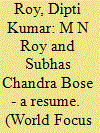

|
|
|
|
|
| Publication |
2013.
|
| Summary/Abstract |
The essay aims at analyzing the political behavior of M. N. Roy and Subhas Chandra Bose in the Indian National Congress from 1936-39. M. N. Roy joined the Congress as a Marxist with a view to radicalize the Congress and bring it under a revolutionary leadership. Subhas Chandra Bose as a leader of the left nationalist force in the Congress was also dissatisfied with general Congress policy and moderate way of Gandhian approach to the anti-colonial movement. During this period both of them came close to each other.
|
|
|
|
|
|
|
|
|
|
|
|
|
|
|
|
| 7 |
ID:
104865


|
|
|
| 8 |
ID:
095054
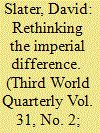

|
|
|
|
|
| Publication |
2010.
|
| Summary/Abstract |
In this article the imperial is envisaged in terms of a multifaceted terrain of analysis that can encourage us to pose a number of interrelated questions. Five issues are identified for discussion. First, the differential way cultural studies and Marxist political economy approaches interpret the imperial present is assessed. Second, the why and how of imperial power are subjected to debate. Third, the overlapping inside and outside of imperialism are identified and analysed. Fourth, the newness of today's 'new imperialism' is highlighted and critically examined and, fifth, in relation to the evolving geopolitics of knowledge, some reflections are offered on the significance of the imperial in global times. The context is predominantly provided by US-Latin American encounters.
|
|
|
|
|
|
|
|
|
|
|
|
|
|
|
|
| 9 |
ID:
102032


|
|
|
| 10 |
ID:
094075


|
|
|
| 11 |
ID:
119707
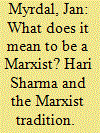

|
|
|
|
|
| Publication |
2013.
|
| Summary/Abstract |
The Hari Sharma Memorial Lecture series was instituted by the Dr. Hari Sharma Foundation for South Asian Advancement in memory of Hari Sharma, who left his estate to the Foundation when he passed away in 2010. The purpose of the series is to present scholars and writers who have made a significant contribution to the struggle for emancipation in South Asia. The first lecture in this series was presented by Jan Myrdal, one of the most prominent Swedish writers, a life-long Marxist, and for many years a friend of Hari Sharma. Myrdal wrote his first book on India, India Waits, after his visit to the "disturbed areas" of Andhra as a guest of C.P. Reddy in 1980. He visited Dandakaranya in 2010 at the invitation of the Communist Party of India (Maoist) and wrote about his conversation with the leadership of the party in Red Star over India: Impressions, Reflections and Discussions When the Wretched of the Earth Are Rising (Kolkata, 2012). Following his speaking tour after the book's release in Kolkata, Myrdal was banned from visiting India by the Government of India.
|
|
|
|
|
|
|
|
|
|
|
|
|
|
|
|